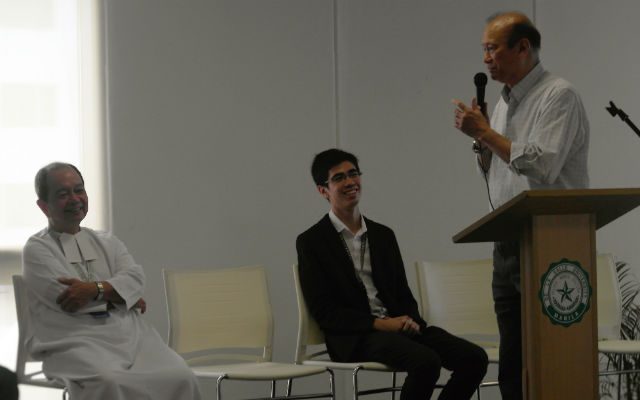SUMMARY
This is AI generated summarization, which may have errors. For context, always refer to the full article.

MANILA, Philippines – In preparation for the upcoming 2016 presidential elections, De La Salle University rebooted “Boto Lasalyano, Sulong Pilipino,” an issue-oriented university-wide campaign with the objective of educating and encouraging Lasallians towards a proactive and educated participation in the elections.
The official launch was held on Monday, August 24, at De La Salle University.
BLSP began during the 2001 senatorial elections, when DLSU partnered with electoral related organizations such as National Citizens’ Movement for Free Elections (NAMFREL) and the Parish Pastoral Council for Responsible Voting (PPCRV).
This year, the BLSP has a 4-part action plan:
- Phase 1 is the ongoing voter registration effort to be held until September 2. They have a goal of 95% eligible voter’s registration as a key performance indicator.
- Phase 2 is voter education, a lineup of programs from various organizations and branches in DLSU.
- Phase 3 is the mock election to be scheduled weeks prior to the national elections, to simulate the voting process and gauge the results of the Lasallian vote. They aim to have an 80% turnout of the total undergraduate population.
- Phase 4 is Lasallian volunteerism, which seeks to encourage Lasallians to monitor the elections through various NGOs and volunteer programs.
Power in numbers
Keynote speaker and La Salle alumni former Senator Ramon Magsaysay Jr., encouraged Lasallians to be patriotic and maximize the right to vote.
“If you don’t vote, that is a negative – you will not be heard“, he said, adding that Filipinos should not act apathetic and individualistic. Magsaysay also advised the youth to exercise “due diligence” by registering, and extensively researching the background, achievements, and advocacies of the candidates.
COMELEC Education and Information Department Director James Jimenez focused on the youth’s power in numbers, and emphasized that this power must be used to initiate positive social change.
The youth comprise roughly 37% of the voting population, according to Jimenez, so they should know the difference they are capable of.
“Nakakapag-trending nga kayo (youth), pero ano naman yung pinapa trending ninyo?” said Jimenez. (You have the capacity to make things trending. The question is, what issues are you pushing for?)
According to Jimenez, the youth should assert themselves as participants in political debates, and not settle for being treated as merely a voting pool. Furthermore, he suggested methods to formulate and further invest in an informed choice: determining one’s vision for the country, creating a platform, and subjecting it to debate and discussion.
With preparations for the 2016 Presidential Elections ongoing, Jimenez stressed a humbling reminder: “There might be a lot of you, but that doesn’t mean you’ll make an impact. You have to get your act together (first).” – Rappler.com
Anna Katrina Quintos is a Rappler intern.
Add a comment
How does this make you feel?
There are no comments yet. Add your comment to start the conversation.